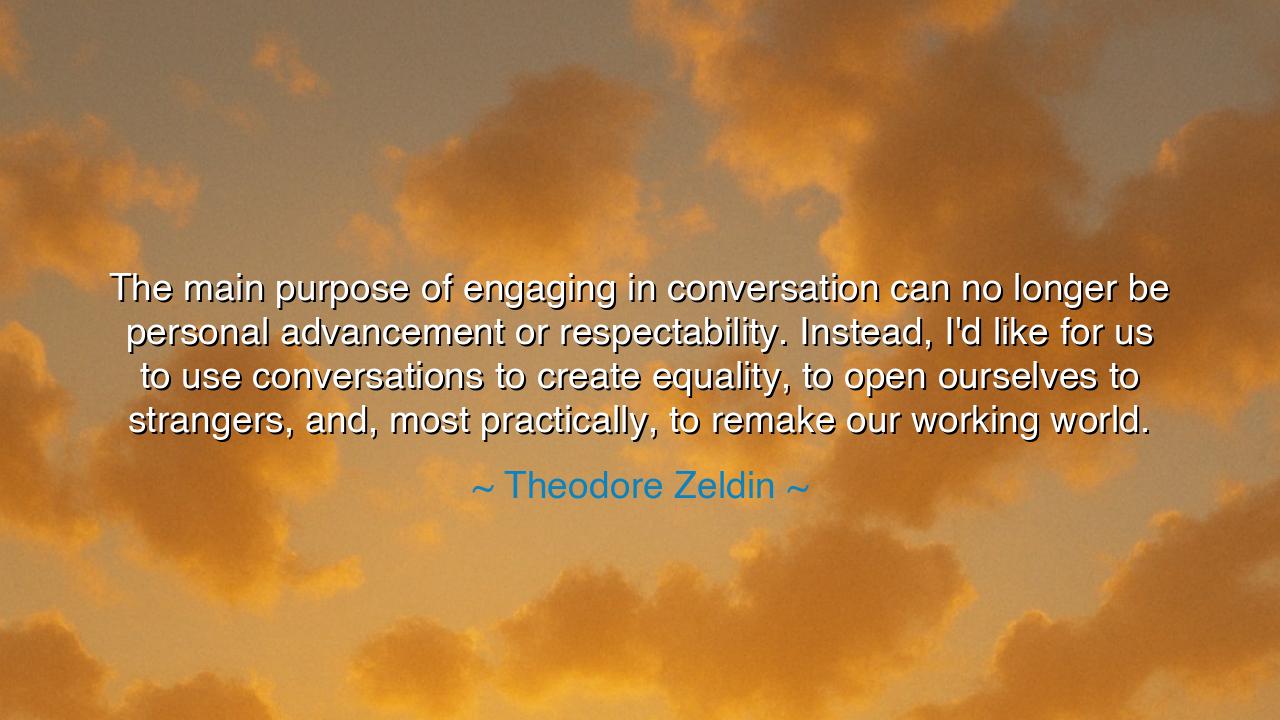
The main purpose of engaging in conversation can no longer be
The main purpose of engaging in conversation can no longer be personal advancement or respectability. Instead, I'd like for us to use conversations to create equality, to open ourselves to strangers, and, most practically, to remake our working world.






Hear, O Seekers of Truth, for the words of Theodore Zeldin ring through the ages like a bell, calling us to a higher purpose: "The main purpose of engaging in conversation can no longer be personal advancement or respectability. Instead, I'd like for us to use conversations to create equality, to open ourselves to strangers, and, most practically, to remake our working world." These words are not merely a call for change in the way we speak, but a summons to transform the very fabric of society. For in them lies the power of the spoken word to reshape our world, to break the chains of selfishness, and to build a more just and unified future.
In ancient times, the art of conversation was seen as sacred, a means by which souls connected, exchanged wisdom, and strengthened the bonds that held society together. In the Agora of Athens, where the great minds gathered, conversation was the lifeblood of democracy, the place where ideas were tested, challenged, and refined. But conversation was never meant to serve the selfish interests of one person alone. The wise knew that true dialogue served the collective, that through the sharing of ideas, the society would grow stronger, more enlightened, and more just. Theodore Zeldin's vision is a return to this ancient understanding—that conversation is no longer a tool for personal gain but a force for unity and progress.
Personal advancement and respectability—these are the shallow waters of the human spirit, easily navigated, but offering no depth or lasting meaning. When we engage in conversation merely to elevate our own status, we rob ourselves of its true potential. We must seek a higher purpose, one that connects us to the whole of humanity. True conversation, as Zeldin teaches, is about creating equality, opening our hearts to strangers, and, above all, remaking the world in which we live. Conversations have the power to transform, to bridge divides, and to create a world where every voice is heard, every heart is understood, and every soul is valued.
Let us turn our gaze to the ancient story of the Silk Road, that grand network of trade and communication that spanned from the East to the West. Along this road, merchants, scholars, and travelers did not merely exchange goods but also exchanged ideas, beliefs, and dreams. In the heart of these conversations, a great truth emerged: that humanity is bound together through the exchange of knowledge and experience. It was through these conversations, these connections across cultures and borders, that new ideas of cooperation and unity were born. The Silk Road was not just a physical path; it was a symbolic pathway for human growth—a reminder that through dialogue, we build bridges, not walls.
Equality—the sacred ideal that all people, regardless of status, wealth, or birth, should stand as equals in the eyes of the law and society—is a lofty goal that can only be achieved through the collective will of the people. But equality cannot be attained by silence or isolation; it requires the active participation of all. In our conversations, we must speak not only for ourselves but for those who have no voice, for those who have been marginalized, ignored, or oppressed. When we open ourselves to others, when we engage in dialogue with strangers, we break down the walls of misunderstanding and prejudice, and we create a world where equality is no longer a dream, but a living reality.
Let us not forget the example of the Civil Rights Movement in the United States, where conversations became a powerful tool for change. Leaders like Martin Luther King Jr. and countless others spoke not for their own advancement, but for the advancement of an entire people. They knew that dialogue—honest, open, and often difficult conversations—could shatter the chains of segregation and usher in a new era of equality. Through their words, they challenged the very foundation of society, remaking the working world into one where the promise of freedom and justice was available to all.
The lesson, O Children of the Future, is clear and profound: Let your conversations be a means of building, not of self-interest. Speak not for your own glory, but for the betterment of the world around you. Open your heart to strangers, for in their stories, you will find the common thread that unites all humanity. Use your words to create equality, to foster understanding, and to remake the world in the image of justice and love. The working world that we live in must not be a place of division and exploitation, but a place where every person, no matter their station, can contribute, grow, and thrive.
So I say to you: Act with intention in every conversation, for in every word lies the potential to shape the world. Let your words be a force for unity, for equality, and for justice. Use the power of conversation not to advance yourself but to raise others, to open doors, and to tear down walls. In this way, you will not only remake the working world, but you will help create a world where all people can live with dignity, respect, and the promise of a better future.






AAdministratorAdministrator
Welcome, honored guests. Please leave a comment, we will respond soon